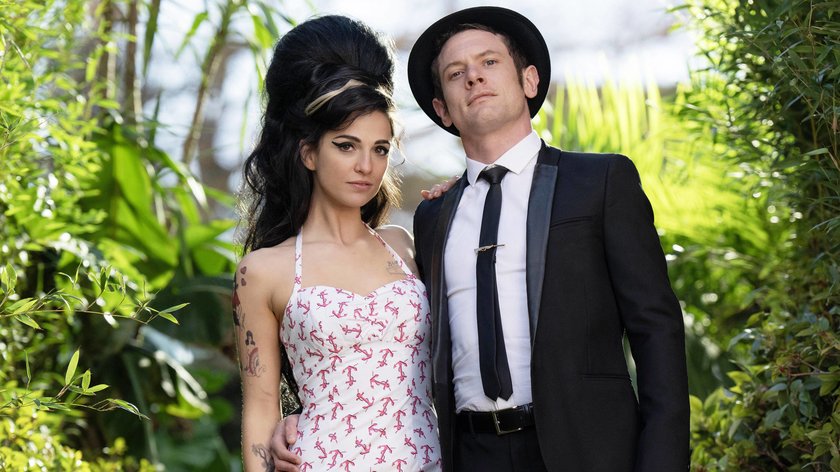
Next week, “Back to Black” will be released, a film that has already faced some criticism, especially on social media, even before its release. We had the opportunity to speak with the director, Sam Taylor-Johnson, and the lead actress, Marisa Abela.
Making a film about Amy Winehouse and portraying Amy Winehouse is an extreme challenge. The jazz singer has captured the hearts of millions with her unique voice and honest songs, and the grief over her untimely death in 2011 still runs deep among fans and, of course, in her personal circle. It’s therefore not surprising that the project received high attention from the start, and many fans are concerned that the film “Back to Black” aims only to commercially exploit the unique artist once again. A storm of outrage erupted when the first image from the set was leaked, continuing with the release of the trailers. If you haven’t watched it yet, you can do so now:
If you’ve already watched the trailer and are not satisfied with the performance and appearance of the lead actress, Marisa Abela, we strongly urge you to still watch the whole film and then make your judgment, because “Back to Black” has turned out much better than the trailer might suggest to some. In the interview, Marisa Abela and Sam Taylor-Johnson explained that they try to avoid comments on social media and trust that the controversy will subside once people have seen the film and had the opportunity to judge the whole story they wanted to tell about Amy Winehouse.
Interview with Marisa Abela and Sam Taylor-Johnson: “The tragedy overshadowed her creative genius” In conversation, Sam Taylor-Johnson drew an interesting parallel between the pre-judgment of the film in parts of the public and the assessment of Amy Winehouse during her lifetime:
“It’s interesting when you look at Amy’s life. Everyone formed a judgment based on the images and in a way forgot about the creative genius because the tragedy overshadowed it. And I think with our film, it’s similar. People see an image and then make their judgments. But the important part for us in telling the story was to take her perspective and be with her, listen to her music, and not pass judgment. So, I think until people have seen the film, there is no voice worth listening to.”
We can only agree with this statement. Because while you can dislike the film and even tear it apart on social media if you wish, doing so based solely on the trailer does not do justice to the work and intentions that went into this project.
How to get out of character? Even the lead actress, Marisa Abela, who was heavily criticized before the release, took her role very seriously and spared no effort to do justice to her role as Amy Winehouse. She took singing lessons every day for months, learned to play the guitar, and had to starve herself with the help of nutrition experts for the role. Getting into a character who is both talented, brilliant, and powerful, but equally fragile, unstable, and depressed is certainly not easy, so we were very interested in how she got out of this role and what measures she took to protect her own psyche.
“For me, it was a process that I went through every night because I’m not a method acting actress; that was never the way I worked. So, I didn’t want to mix these complicated feelings with my own emotions. I was very cautious and understood that I would go through a deep psychological phase that would influence my work, but I didn’t want it to have an impact on me as a person in my real life. So, it was really a process every night to get out of character, and I did that in several different ways. But what ultimately happened for me was more like there wasn’t much of me left, so you become a kind of blank canvas on which something else can be placed. And then every night, you wash it off, go to sleep, and in the morning, you paint it back on. But then, when the film was finished, you’re left with this empty canvas. So, it was more about finding myself again than necessarily cleaning myself from Amy. Definitely, though, there are things left behind, lessons I could draw from playing a woman like her. Perspectives on life that are different now. But the main challenge regarding getting out of the role was finding myself again.”
This statement naturally prompts the question of what perspectives on life have changed for Marisa Abela through the role:
“The feeling that authenticity is okay and that the goal is not to be consumed and enjoyed, but to carry things outward with integrity, and whatever happens, happens.”
“Back to Black” tells a love story, and Marisa Abela stars alongside Jack O’Connell, who plays the role of Amy’s divorced husband, Blake Fielder-Civil. We were interested to know if the chemistry between the pair was right or if there were difficulties to overcome. Was it easy to portray this great love?
“Yes, in a way it was. The interesting thing about our dynamics as actors is that Jack is much more experienced than I am. I’m relatively new to the film industry compared to Jack. And I think this kind of dynamic… the interesting thing about it was that it’s Amy’s story, so I’m actually embodying the core of this film, and Jack supported me in that. But I had high respect and admiration for him as an actor. So, we could come to have what Amy and Blake had. Blake was the supportive character in Amy’s life, and I believe they struggled with that in their relationship. She always tried to make him feel like the most important person in the room, despite the fact that she was the icon, Amy Winehouse. So, the relationship Jack and I had as actors was conducive to that and really helped.”
A film focusing on love and music A feature film can’t possibly fully depict the career and life of Amy Winehouse; of course, there has to be selection. We wanted to know from Sam Taylor-Johnson how the decision-making process went, what events made it into the screenplay by Matt Greenhalgh and which did not:
“It was a very clear process, quite quickly in a way. Because we discussed what music should be in the film and what feeling the audience should come away with. And it turned out that what we really want is for people to uphold her and celebrate her. And the story we wanted to tell was about the creation of her music. We’re all connected to her through her voice. And we wanted to show her life from her perspective and not how we all perceived her through the media and documentaries, but through her music. And that sort of dictated the next steps and made our path very clear because it’s almost like a musical, not a traditional musical, but the narrative of the film is told through each song. She told everything so unfiltered in her songs, what emotionally moved her at that time. That gave us a very clear path. And anything that seemed excessive or unnecessary just fell away.”
We’re curious how you’ll feel when you come out of the film, but you probably have a strong desire to listen to Amy Winehouse again, and that would also be the reaction that Sam Taylor-Johnson hopes for from her work.
“Her downfall was so fascinating to everyone, and everyone feasted on it. For me, it feels like the media and documentaries completely dissected her life and then came to the point of, oh, now she’s dead, let’s see who we can blame for it. Because we lost someone so special. When we lose someone like Amy Winehouse, someone so beloved, then we need a place for our emotions. And I thought, let’s not demonize or blame anyone, let’s just look at what we want to celebrate. And let’s look at her as a whole person and who she loved and why. And the album ‘Back to Black’ arose from such a powerful love. And our judgment about her father, her family, her ex-husband, and whether they should have behaved differently is irrelevant because we remain in her perspective of love. And with this film, we go back to her music and what emotionally moved her. And this journey is much more important; it’s more about forgiveness and understanding and a bigger picture, which I believe we all need.”
“Back to Black” will be released on April 11, 2024, in German cinemas, and along with it, the soundtrack of the film will also be released, which includes original songs by Amy Winehouse as well as the music that influenced the singer and is also heard in the film, such as the “Song for Amy,” contributed by Nick Cave and Warren Ellis alongside the film’s score.




